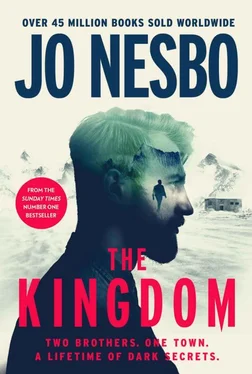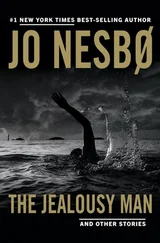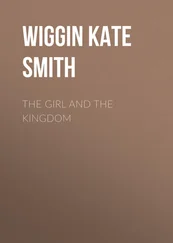‘In order to survive therefore, we have had to adopt the same maxim as the one my father taught my brother and me. Do what has to be done.’ His gaze met mine. And stopped its flitting. He still looked tormented, but a slight smile crossed his lips. ‘So that’s what we do. Every day, every time. Not because we can, but because we have to. So each time we meet adversity, each time a flock wanders over the clifftop, a crop freezes, or the village is cut off by a landslide, we find a way back out to the world again. And when the route of the main highway is changed, and there is no longer a way in for the world out there, then we make one. We build a mountain hotel.’ His voice was sounding a little livelier now and, almost imperceptibly, he stood up straighter. ‘And when the hotel burns down, and everything lies in ruins, then we look upon the scene of destruction and we despair…’ He held up his index finger and raised his voice. ‘…for one, single day.’
His gaze moved on from me and seemed to find other places to dwell, other invitations to accept.
‘When we’ve laid our plan, and things don’t work out as expected, then we do what we have to do. We make another. So things aren’t exactly as we had imagined they would be. Fine. Then let’s imagine something else.’ Again his gaze found mine. ‘For mountain people like us there is no place for useless sentimentality, no alternative in looking backwards. As our father used to say: kill your darlings and babies . Let us look forwards, my friends. Together.’
There was a long, deliberate pause. Was I mistaken, or did Jo Aas just move his head? Yes, that was a nod. And as though that had been the signal he had been waiting for, Carl continued.
‘Because we are together, whether we like it or not. Like a family, you, me, all of us here this evening are together in a fateful union from which we cannot opt out. We, the mountain people of Os, will go down together. Or we will rise together.’
The mood turned. Slowly, but I could feel it. The lynching atmosphere was gone. Still a certain cool scepticism, of course. And as was only to be expected, an as yet unarticulated demand that Carl give his answers to certain vital questions. But they liked what they were hearing. Both what he said, and the Os way he said it. And I realised that the uncertain opening had been deliberate. That he had taken note of what I had said. Everybody loves a comeback kid.
But then, just as it seemed as though he had them hooked, Carl took a step backwards from the podium and showed the palms of his hands to the gathering.
‘I can’t guarantee anything. The future’s too uncertain for that, and my powers of prophecy too feeble. The only thing I can guarantee is that, as solitary individuals, we are condemned to failure. We are as the sheep that has wandered from the flock and will be eaten up or freeze to death. But together, and only together, we have at least this one, unique possibility of getting out of the bind we undeniably find ourselves in, as a result of the fire.’
Again he paused, standing there in the semi-darkness beyond the podium. I just had to admire him. That last sentence was a bloody rhetorical masterpiece. In that one sentence he had done three things. One: appeared honest in admitting it was a setback but putting all the blame on the fire. Two: through a sort of inspired moralism preached solidarity, at the same time as handing responsibility for doing something about the situation onto everyone sitting in front of him. Three: appeared cautious, by stressing that a newly built hotel wasn’t a guaranteed solution but only a possibility , at the same time as he implied that it was unique, and therefore the only one.
‘But if we do this right, then we’ll do more than just get out of a bind,’ said Carl, still from the semi-darkness.
I’m pretty sure that one of the reasons he arrived early was in order to arrange the lighting. Because when he once again moved forward into the light falling on the podium, the visual effect was as striking as his words. The man who had seemed so worn out and troubled when he entered the stage was suddenly transformed into a bullish demagogue.
‘We will make the village of Os blossom,’ he boomed. ‘And we will do it by building a hotel that is without compromises, that is without expensive tat like trolls and timber, because we believe that modern people, in search of an authentic experience, will find themselves entering the world of the Norwegian folk tale the moment they leave the city limits. The mountain is what they want, and that is without compromises too. So we’ll build a hotel that submits to the mountain, that fits in, that obeys the mountain’s own inexorable rules. Concrete is the material that comes closest to the mountain’s own conglomerate. We’ll build it like that not just because it’s cheaper, but because concrete is beautiful.’
He looked out over the gathering as though challenging them, urging them to protest. But the silence was total.
‘Concrete, this concrete, our concrete,’ he almost sang in the chanting, hypnotising rhythm of a salvationist preacher, at the same time as he beat out the same rhythm with his forefinger on the laptop standing on the lectern, ‘is like us. It is simple, it can withstand the storms of autumn, of winter, defy avalanches, lightning and thunder, extreme weather, hurricanes and New Year rockets. In a word it is a material that, like us, survives. And because it is like us, my friends, that makes it beautiful!’
This was obviously the cue for someone in charge of the projector, because at that moment music came pouring through the loudspeakers. And the hotel – the same hotel that I had seen on Shannon’s very first drawings – appeared on the illuminated screen. Green forests. Sunshine. A stream. Children playing, people strolling in summer clothing. And now the hotel didn’t look at all sterile but like a calm, firm canvas for the life that was drawn all around it, something permanent, like the mountain itself. It looked, quite simply, every bit as fantastic as Carl had described it.
I could see he was holding his breath. Dammit, I was holding my breath too. And then the room erupted.
Carl let the applause ring out, milking it. Stepped forward to the podium and silenced them with raised hands.
‘And since you clearly like it, how about a round of applause for the architect, Shannon Alleyne Opgard?’
She emerged from the wings and into the spotlight, and once again the room erupted.
She stopped after a few steps, smiled, waved to us, laughed happily, and remained there just long enough to show us that she appreciated the response but that she didn’t want to distract their attention from the village’s real hero.
After she’d left, and the applause died down, Carl coughed and gripped the sides of the lectern with both hands.
‘Thank you, friends. Thank you. But this meeting is about more than the appearance of the hotel. It’s also about future plans, a timetable, finances, accounting and the election of representatives for the owners.’
He had them in the palm of his hand now.
He was going to tell them that work on the resurrection of the hotel would begin in two months, in April, take just fourteen months, and that the cost would rise by only about twenty per cent. And that they had made a new deal with the Swedish operator who would be running the hotel.
Sixteen months.
In sixteen months from now, Shannon and I would be out of here.
Shannon sent a message she wouldn’t be coming to Notodden as arranged, that from now and until the recommencement of building work in April she, as leader of the project, had to give it her full and complete attention.
Читать дальше












